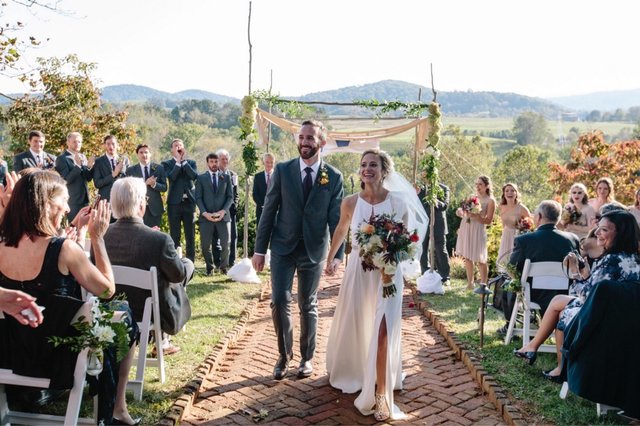
A few weeks ago, at a writing conference in Tampa, I went to a panel titled “Writing Badass and Nasty Women.” The panel was composed of five incredibly inspiring female writers. They spoke about Wonder Woman, the Little Red Hen, Emily Dickinson, and Medusa, among other examples of female strength. For many of the real and fictional women we celebrated that day, their independence seemed to be an inherent part of what made them “badass.” They didn’t rely on a man for anything. They were fully alone, striking out in the world on their own — solo, unattached, and proud of it.
As I sat there, celebrating so many of the women who made me proud to be a woman myself, I felt, for a moment, ashamed that I was married, that my life was so wound up in a man’s and his in mine. “Am I a feminist failure?” I worried. Am I selling out by not being completely on my own?
We’re in a time when the horrendous actions of some men are often projected onto all men. “Who would want to be with a man these days?” someone recently said to me. “Fuck men,” I overheard in a bar. Really? I wanted to say. All 3.5 billion of them? Now, when women’s rights to their bodies are being threatened in ever more aggressive ways and the number of men who have abused their power against women continues to rise, it can be easy, as a woman, to resist wanting a man — to be unattached and free from male influence.
As a married woman, I’m also very aware that the entire institution of marriage was founded upon the oppression of women, treating them as property to produce heirs. By marrying my partner, I’ve wondered, have I perpetuated the unequal, male-dominated underpinnings on which our society was founded? Would I have been truer to myself, a trailblazer like so many badass women before me, had I refused to willingly enter into such a patriarchal system?
I’ve thought long and hard about what my decision to get married means to me as a feminist, as someone who values my womanhood, freedom, and independence, and who struggles daily within the bindings of a gender-biased world. In the age of social media and snap judgments, it’s especially easy to be influenced by what other people might think, to do something or to avoid it because of how others might perceive you. But I’ve come to believe that being badass means doing whatever is true to you regardless of the pushback or how your decisions appear to others or the silent (or not so silent) judgment that might be sent your way.
Like many women I know, I’ve been mistreated by men and taken advantage of because I am a woman. But I also have an abundance of supportive, respectful, good-souled men in my life. Men who are as heartbroken, angry, and disbelieving as I am that a sexual predator, among other things, is sitting in the White House. One of those men is my husband.
We are about as different as two people can be. I’m a writer, an artist, and a severe empath, sometimes to a fault. (I cried one time when I accidentally killed a fly.) Will is math-brained, logical, and rational sometimes to the point of frustration (mine). At home, Will and I assume many traditional gender-based roles. I do all the cooking, and he makes the bulk of our money. But we don’t do these things because that’s what society has told us to do. We do them because they work for us. Cooking brings me more joy than almost anything else in the world. Will is invigorated by his job, and his financial stability allows me to live the less consistent artistic writing life I prefer, love, and need.
A few autumns ago, we got married on a hilltop in Virginia. I wore a white dress. My dad walked me down the aisle. I struggled a lot while we were planning the wedding with whether I should enact some of these oldest traditions. In the end, I decided to wear a white dress because it looked awesome against my Mediterranean skin. I asked my dad to walk me down the aisle because I wanted him to stand next to Will, his parents, and me during the ceremony as a symbol of our love for our families.
I also worried that by becoming married, I’d lose some of my independence, but I’ve found the opposite to be true. Will and I have made sure of it. While he and I share many things, like a home, a dream to be parents, and rent, we each have our own careers, interests, friends, and routines — things we don’t share on a daily basis or at all. Often, I feel most independent when I travel. Last fall, I spent two months by myself on a 120-acre ranch in Colorado writing and caring for animals while he stayed at our home in New Orleans to work, happy I was off doing my thing. In summer, I travel for months at a time to other countries to teach creative writing.